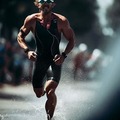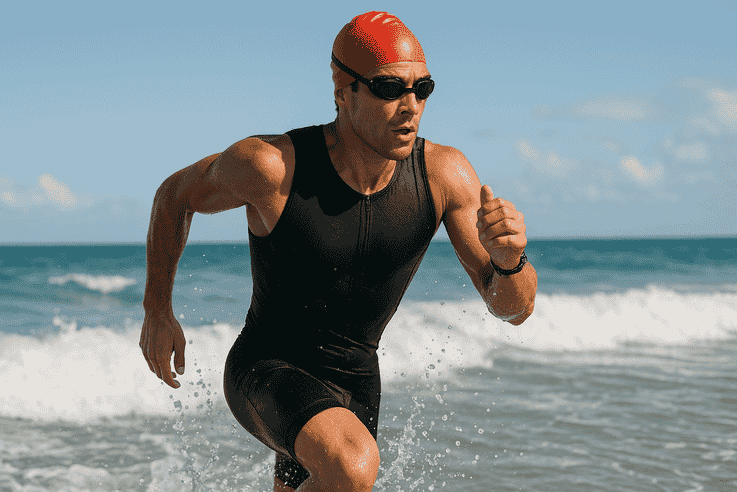Mind Training for Triathlon

For over three decades as a mental trainer, I have worked with triathletes to enhance performance. This often includes common issues such as anxiety about the open-water swim, transitions, technical failures, performance pressure, fatigue, and endurance.
Triathletes are often surprised how quickly mind techniques help both in preparing for events and overcoming race-day challenges:
Intimidation, doubts, open-water anxiety, transitions, technical failures, performance pressure, fatigue, endurance - mental training transforms it all.
Along with various forms of anxiety, many competitors experience intimidation, particularly when they see the size and power of other athletes.
This often triggers nerves and apprehension, draining vital energy - all the things that sabotage strong triathlon performance.

Mental training allows you to compete with a calmer, clearer mind, and to fully execute your expertise under pressure.
Mind mastery is no different from mastering physical skills - you must train at the inner gym. Developing unshakable belief, focus under pressure, and pre-programming your performance leads to endless rewards.
Today, I’ll show you powerful techniques you can practice at home - both traditional methods and the latest fast-track techniques used by elite competitors to access peak performance and overcome barriers.
Mental training helps you gain confidence in weaker areas - whether it’s the swim, bike, run, or transitions.
It helps you increase consistency and access "the Zone The Zone is the peak performance state where your body runs directly from the subconscious Your subconscious is the powerhouse of peak performance, controlling all bodily movement, storing your training experience and muscle memory, and guiding your body with effortless efficiency and precision. Estimated to be 275,000 times more powerful than the conscious mind [University of Pennsylvania] . Movements flow naturally, distractions fade, and effort feels effortless as you perform at your absolute best. " - the mental state that unleashes your peak performance, where you compete freely and instinctively.
Mental techniques not only boost performance, but also protect you from negativity - such as self-sabotage, nerves, doubts, missed opportunities, fear of failure or even fear of success.
Mental Training Benefits

Focus & Concentration
Triathlons require intense mental focus, especially during long, grueling races. Mental techniques help you stay focused and maintain concentration during the toughest segments.
Stress Management
The pressure of competition and training can be overwhelming. Mental training teaches you to stay calm, manage stress, and maintain a positive mindset - preventing nerves from sabotaging performance.
Visualization
Visualization is a powerful tool for mentally rehearsing races, refining technique, mastering transitions, and preparing for various conditions and competitors. Once mastered, it adds a new dimension to performance.
Self-Confidence
By focusing on strengths and past achievements, mental training builds unwavering confidence, helping you push limits and embrace challenges.
Goal Setting
Setting clear, achievable goals keeps you motivated and focused on long-term success.
Positive Self-Talk
Most athletes underestimate the power of their inner voice. Positive self-talk replaces doubt with confidence, boosting motivation and keeping you mentally sharp.
Champions Do Things Differently
"Visualize success, and you're already halfway there."
– Jan Frodeno
"The key to success in this sport is mastering the art of mental resilience."
– Manuel Huerta
"Visualization breathes life into the canvas of your success."
– Laura Bennett
"Visualization is a powerful technique that can help you achieve your goals."
– Manuel Huerta
How to Train Your Mind at Home
 |
|---|
For generations, athletes have relied on powerful techniques like visualization to gain a competitive edge. Now, with advancements in modern technology, these techniques have become even more sophisticated
I will outline some examples for you shortly, which you can practice at home (as effective do-it-yourself programs are what most people are asking for).
I have outlined the various options below to cater to different levels, so you can choose the best path you'd like to explore..
Choose Your Training Path
Pick the approach that matches your competitive level and timeline
Depending upon your level of experience and expertise, there are two distinct approaches to mental preparation:
1. Accelerated Techniques - Audio MP3 subconscious training for faster results, or
2. Manual Methods - Free self-guided training options listed below.

|
|---|
Accelerated Techniques
Intermediate & Advanced Competitors
Results in 4–6 weeks instead of 12 months
Manual visualization requires 20-30 minutes of focused practice daily for 6-12 months to rewire your subconscious patterns.
The audio program does this work FOR you - embedding the same mental patterns directly into your subconscious while you relax or sleep. Same result, 10x faster.
How it works: The audio uses theta brainwaves - the same
state your brain enters during deep meditation or right before sleep. In
this state, your subconscious (where all your automatic responses and
muscle memory are stored) accepts new patterns without resistance.
Result: Winning mindsets install automatically while you relax. No conscious effort. No overthinking. Just results.
No daily practice required. No manual repetition. Just press play and let your subconscious do the work - using the same methods I've refined over decades coaching elite athletes. $29.95
Fast-Tracking Your Results
Mind Training for Triathlon
by Craig Townsend (Dip. Clin. Hyp)
MP3 Download $29.95
Incl. Bonus: Sleep Subliminal (value $30)
1 Year Unconditional Warranty
Time Investment Comparison
| Method | Daily Time | Total Hours |
| Manual Methods (outlined further below) | 30 min | 182.5 hours |
| Audio Program | 20 min | 14 hours |
✓ Save 168.5 hours - while getting stronger results
Or for the most serious competitors, the ultimate solution is fully customized and tailored personally...
Personalized Mind Training
Mind Programs for Advanced & Elite Competitors
The next-level of training is to check out NeuroFrequency Programming - a system of customized
theta-level
Theta brainwaves (4–8Hz): Unlocks heightened creativity, mental clarity, and subconscious alignment - ideal for accelerated learning, focus, and peak performance.
mental training recordings, personalized to your exact needs, training, schedule, mindset, and competition challenges - to deal with confidence, focus, resilience, and overcoming nerves or lack of belief.
This shifts your mind quickly into a higher gear - integrating your training deeply at the software level, to create strong and lasting improvements in performance, mindset, and results. More details below.
Still Deciding?
Choose the audio program if:
- You compete regularly and need faster results
- You struggle with consistent manual practice
- You want proven methods used by elite athletes
Choose manual methods if:
- You're just starting your mental training journey
- You have 6-12 months to develop these skills
- You enjoy structured daily practice routines
Manual Methods
Developing Competitors
Of course, if you are just starting out, time is not an issue, and quick turnaround on results is not urgent - you can always begin by practicing the various mental exercises manually - and I will provide you a complementary relaxation download that will get you started (see the 12 Minute Relaxation download further below). You can always progress to the next level later on - which will combine these and other techniques simultaneously, to further accelerate your results. (see below).
For those who can dedicate time to regular to regular practice and reinforcement, I have provided a selection of options and info below you can work through, and explore further.
(if you have further questions - simply drop me an email)
 |
|---|
1. Embedding Positive Core Beliefs
This exercise, called a contemplation, embeds powerful new core beliefs within your subconscious, as these enormously influence performance.
Your beliefs - weak or strong - ultimately determine your results - your susceptibiity to unconscious self sabotage, and how far your potential can develop. They are the dominating force - more powerful than motivation, talent, ability, fitness, power, etc.
These are your 5 Core Beliefs list to instill, below. Focus on each point in the list for 30 seconds daily, thinking of positive thoughts related to the topic and reasons why it's true for you.
Do this until the reasons are true for you.
1. I am a powerful triathlon machine. My endurance is unstoppable across all disciplines.
2. I am ready. All my hours of training and discipline will take care of the rest.
3. Nothing can stop me, and nothing gets in my way. I am pure resilience.
4. I remain focused and adapt my pace, always knowing when to cruise, and when to accelerate.
5. No matter what happens, I handle everything I encounter - and I succeed anyway.
 |
|---|
2. Visualization Exercises
Normally, I'd teach you to visualize completely unassisted - but I don't want to leave you without guidance. To get you started, grab the 12 Minute Relaxation download (it's free). This will guide you into the right mental state for visualization - like having training wheels until you can do it solo. (NB. it's in a zip file so the download might work better from PC).
Needless to say, the initial and primary visualization should be of yourself competing at your absolute peak of your performance - with as much, or as little, detail as you wish - while imagining experiencing great confidence and inner power while you are performing - along with the joy of success afterwards.
Do this each day, while in a relaxed state (by using the recording, or otherwise directly before or after sleep are excellent times), and ensuring you use all your senses - ie. ensure the images are vivid, realistic, present-tense, positive, and without any external distractions.
If, like most others, you find your motivation to manually do these exercises eventually peters out altogether - just make sure you do this one exercise.
While the results wont be as quick as using the specialized programs, slowly but surely this will bring about improvements, so be patient. As you progress in your development, consider integrating the following aspects to enhance your mind's capacity to visualize flawless performance.
As there are literally hundreds of different ways you can use imagery for various different purposes, I have included some options you can experiment with later on.
But for now, keep to the basics, and make sure you practice regularly.
*
Mental Imagery Examples.....
* Success - crossing the finish line with your arms raised in victory, receiving your medal, and feeling a sense of accomplishment. This enhances your confidence and motivates you to train harder.
* The route - Picture the course in your mind, visualize the turns, hills, and transitions. This improves your ability to plan and strategize your race.
* Pushing through challenges - overcoming obstacles such as fatigue, pain, and mental barriers. This expands your mental toughness and perseverance.
* The crowd cheering you on - Picture the supporters along the route cheering and encouraging you. This boosts your morale and gives you a sense of community.
* A smooth transition - efficiently moving from one stage to the next without fumbling. This develops your coordination and technique.
* A strong finish - accelerating towards the finish line with speed and power. This enhances your physical and mental endurance.
3. Affirmations for Performance
You can also manually recite a mantra over and over again silently in your mind, which is a manual auditory method which can be targeted towards specific uses - plus work great to drown out nagging negative thoughts during performance.
Note: Ensure you use a great deal more repetition to create the necessary reinforcement, seeing these will be recited at the conscious, rather than subconscious, level. A manual way to get around this can be reciting mantras in the shower, which relaxes the mind and body.
Some examples below.. ensure the statements are positive, present-tense, and with no hidden or reverse negatives.
"I am a powerful triathlete" - the belief that you have the strength and ability to excel.
"I am in perfect condition" - helps you believe that your body is capable of performing at its best.
"I have the endurance" - builds confidence in your ability to finish, even when it gets tough.
 |
Listen....
* Audio - 'The Power of Visualization & Belief'
- Craig Townsend explains how these transform performance.
Click the 'Play' symbol to start the audio.
🎧 Free MP3 Download - Get Started Today
Experience the power of guided hypnosis with our free relaxation program.
💡 No email required - instant download. Want more? Check our full collection.


